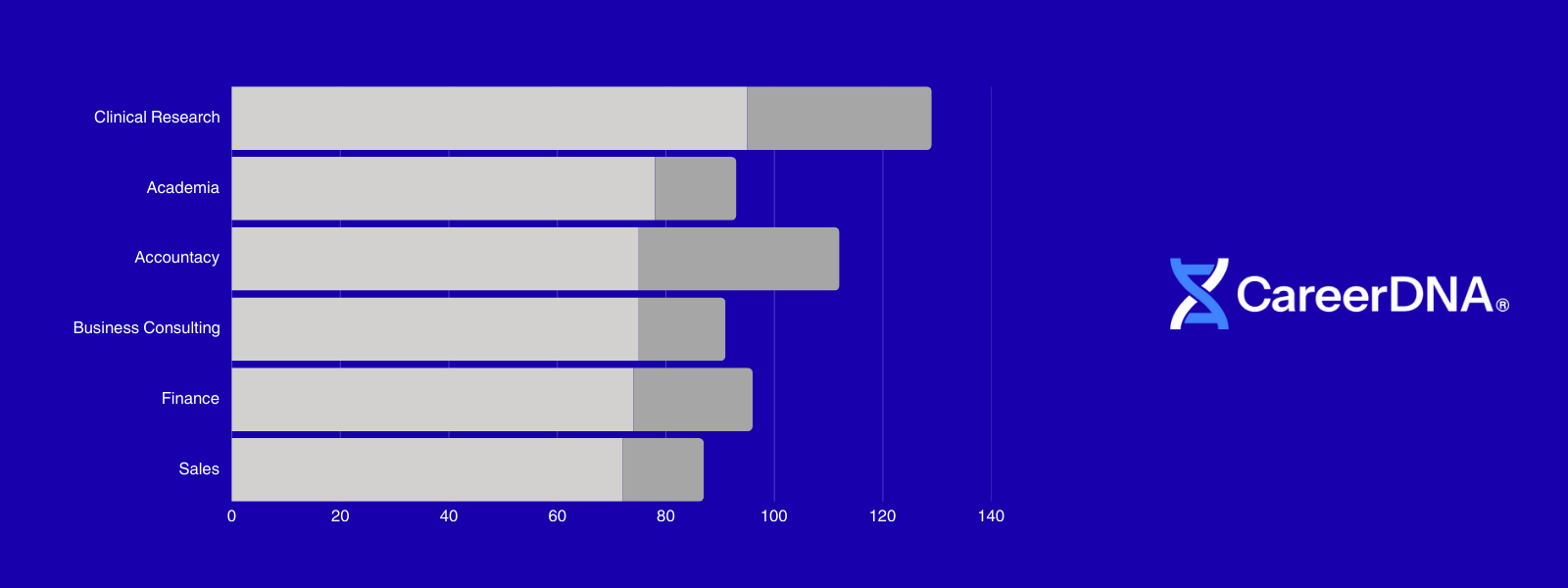Choosing a first job after graduation can shape the next decade of your career. To make that choice easier, CareerDNA analysed more than 50 million career histories to see which entry roles most often lead to fast promotions and senior outcomes. We summarise this as a Career Growth Score. It lets you compare roles by long‑term potential, not just starting salary.
What is a Career Growth Score?
Career Growth Score is an index out of 100 that reflects where people who start in a given role tend to end up. Higher scores indicate stronger progression to senior levels and leadership. Alongside the score we show median years in role, which indicates how long people typically stay before moving up.
Top 10 graduate jobs for long‑term growth
CareerDNA ranking based on 50M+ career histories
| Role |
Career Growth Score (out of 100) |
Median years in role |
| Clinical Research Associate | 95 | 3.4 |
| Assistant Professor | 78 | 1.5 |
| Accountant | 75 | 3.7 |
| Business Analyst | 75 | 1.6 |
| Financial Analyst | 74 | 2.2 |
| Account Executive | 72 | 1.5 |
| Management Consulting Associate | 68 | 1.0 |
| Research Associate | 62 | 0.9 |
| Junior Designer | 58 | 1.1 |
| Prompt Engineer | 52 | 0.7 |
Why your first role matters
The first role sets your pace. Roles with high growth scores typically give you three advantages:
- Broad exposure to functions and senior stakeholders.
- Clear skill pathways that employers value across industries.
- Faster access to stretch projects and promotions.
Avoid underemployment
Accepting a role that does not require a degree often depresses seniority and pay for many years. In our data this drag can last 8 or more years. Short internships or traineeships are fine, provided there is a clear next step or conversion path.
How to choose between high‑growth roles
Skill fit. Map the core skills you want to build in the first two years. Analysts build problem solving, research roles build methodical thinking, commercial roles build negotiation and pipeline discipline.
Industry stability. Regulated or research‑led sectors tend to offer steady progression. Fast‑moving consumer or tech roles can accelerate growth if you learn quickly and switch intelligently.
Transferable outcomes. Choose roles that create options. Analysts and finance roles travel well across sectors. Commercial roles create leadership pathways in sales and general management. Research roles can lead to product, strategy, or operations.
Role spotlights
Clinical Research Associate. High score driven by regulated healthcare demand and clear certification ladders. Strong route to project leadership and operations.
Business Analyst. Exposure to multiple teams and data makes this a reliable springboard into product, strategy, and operations.
Financial Analyst. Well defined ladders, portable skills, and clear links to FP&A management and divisional leadership.
Management Consulting Associate. Steep learning curve, strong networks, and credible exits into strategy, product, or operations leadership.
How to use this ranking
You can find the latest roles here. Every vacancy is scored for both growth and employer stability.
Make a plan:
- Shortlist 2 to 3 roles that match your skills and interests.
- Look at employers that are known for structured training and rotation schemes.
- Prioritise roles with clear progression criteria and documented promotion timelines.
- Use informational interviews to validate day‑to‑day realities before you apply.
About the data
These rankings are based on aggregated and anonymised career histories. Scores are directional and best used to compare roles, not to predict individual outcomes. Your results depend on performance, geography, industry cycle, and company quality.
.png)


.svg)


.png)